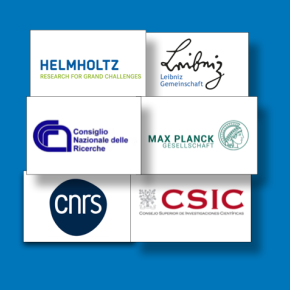Artificial intelligence: the G6’s recommendations
The six leading European research organizations, united within the G6 network – CNR (Italy), CNRS (France), CSIC (Spain), Helmholtz Association, Leibniz Association, and Max Planck Society (Germany) – representing 135,000 staff members, have published a joint statement calling for an ambitious European strategy for artificial intelligence in science.
In this statement, the G6 welcomes the European Commission’s initiative to develop an ambitious strategy for artificial intelligence (AI) in science (“AI in Science”). Building on the AI Continent Plan, which aims at making European Union a global leader in artificial intelligence, and in light of the Commission’s recent publications (see box), the signatories say it is now more imperative than ever for Europe to assert its leadership by supporting a research and innovation policy that meets global challenges, in line with European values and the needs of all scientific disciplines.
European AI at the service of science
In February 2024, the European Union adopted the AI Act, its first major legislation on artificial intelligence. It classifies AI systems according to their level of risk and imposes stricter rules for sensitive uses. Exceptions are made for research: laboratories can test AI more freely as long as it is not placed on the market.
In April 2025, the Commission launched an action plan to make Europe a leader in artificial intelligence (AI Continent Plan). It provides for greater cooperation between researchers, businesses and institutions. ‘AI Factories’, including France's AI2F (led by GENCI in association with the CNRS, among others), will help to create and test AI technologies. Finally, a report published in June recommends that European countries better integrate AI into research by training scientists, sharing tools and facilitating networking.
The G6 emphasizes the importance of substantial investment in fundamental research in AI, the cornerstone of all future innovation, while also promoting the development of shared infrastructures, talent mobility, and the creation of interdisciplinary platforms bringing together academic and industrial stakeholders. It calls for the establishment of common standards in ethics, data governance, and environmental impact, to ensure the responsible and sovereign development of AI in Europe. According to the G6, these priorities must be accompanied by strong support for training, international cooperation, and the valorization of scientific results, so that AI becomes a true driver of competitiveness and progress for society.
With this statement, the G6 also reaffirms its commitment to actively contribute to collective reflection and action, so that AI benefits all disciplines and fully supports the resolution of today’s major challenges.
Examples to follow
The G6 also lists a set of infrastructures and facilities already present within the research organisations in the network. With the AISSAI (AI for Science, Science for AI) center, which fosters interdisciplinary collaboration between AI experts and scientists, the CNRS has established itself as a leader in EU’s AI landscape. The CNRS also hosts one of EU’s leading AI-dedicated supercomputer, Jean Zay, supporting over 1,400 projects annually with applications ranging from cancer research to climate simulations.
